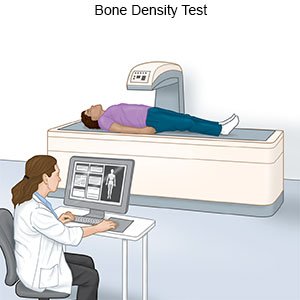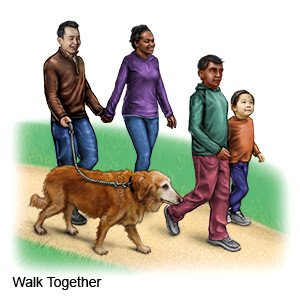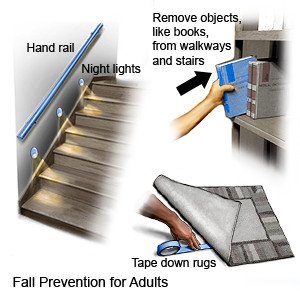Bone Density Test
Medically reviewed by Drugs.com. Last updated on Aug 4, 2025.
AMBULATORY CARE:
A bone density test,
or densitometry, is a scan that measures bone density. It is also called a dual energy x-ray absorptiometry (DXA) scan. The test uses x-rays to show if your bones have lost minerals, such as calcium. The loss can cause your bones to become weak and increase your risk for osteoporosis. A bone density test is usually done on your hip, spine, or forearm. It can also be done of your entire body. You may need the test to diagnose osteoporosis, or to check your risk of bone fractures. Your healthcare provider can also monitor changes in your bone density. A bone density test is recommended for healthy women 65 years or older, and healthy men 70 years or older. The test is also recommended for anyone who is at high risk for bone loss.
How to prepare for a bone density test:
Your healthcare provider will tell you how to prepare for the test. You may be told not to take calcium supplements the day of your test. You will be told what clothing to wear. Remove any metal that is near the body area being scanned. This includes jewelry, clothing with zippers, coins, body piercings, or an underwire bra. If you are a woman, tell your healthcare provider if you are or think you might be pregnant. There is a risk to your unborn baby from the radiation used during an x-ray. Your healthcare provider will talk to you about this risk.
What happens during a bone density test:
You will lie on a table. A scanner will pass over the area and take pictures. You will need to stay still during your scan so the pictures of your bones are clear. The scan lasts between 10 and 30 minutes, depending on the area being scanned.
 |
Risks of a bone density test:
The scan may not show bone loss, and you may not get needed treatment. The scan may show abnormal bone density when you have had no bone loss. If this occurs, you may get treatment you do not need. You will be exposed to a small amount of radiation from the x-ray machine.
Related medications
Seek care immediately if:
- You fall and think you may have broken a bone.
- Your condition or symptoms suddenly get worse.
Call your doctor or orthopedist if:
- You have questions or concerns about your condition or care.
Protect your bones to help prevent osteoporosis:
- Eat foods that are high in calcium and vitamin D. Calcium and vitamin D work together to strengthen bones. Examples are milk, cheese, yogurt, salmon, tofu, almonds, and beans. Limit caffeine. Ask your healthcare provider if you need a calcium or vitamin D supplement.


- Exercise for at least 30 minutes, 3 times a week. Do weight-bearing exercises, such as walking. Exercise can help increase your bone density and decrease your risk for fractures. Ask your healthcare provider about the best exercise plan for you.

- Prevent falls. Keep your home well lighted so you can see things clearly. Remove throw rugs, or secure them to the floor. Install grab bars near your bathtub and toilet. Ask your healthcare provider for more information about preventing falls in your home.

- Limit alcohol. Women should limit alcohol to 1 drink a day. Men should limit alcohol to 2 drinks a day. A drink of alcohol is 12 ounces of beer, 5 ounces of wine, or 1½ ounces of liquor.
- Do not smoke. Smoking can decrease your bone density, and increase your risk for a broken bone. Nicotine and other chemicals in cigarettes and cigars can also cause lung damage. Ask your healthcare provider for information if you currently smoke and need help to quit. E-cigarettes or smokeless tobacco still contain nicotine. Talk to your healthcare provider before you use these products. Ask your healthcare provider for information if you need help quitting.
Follow up with your doctor or orthopedist as directed:
Write down your questions so you remember to ask them during your visits.
© Copyright Merative 2025 Information is for End User's use only and may not be sold, redistributed or otherwise used for commercial purposes.
The above information is an educational aid only. It is not intended as medical advice for individual conditions or treatments. Talk to your doctor, nurse or pharmacist before following any medical regimen to see if it is safe and effective for you.
Further information
Always consult your healthcare provider to ensure the information displayed on this page applies to your personal circumstances.
